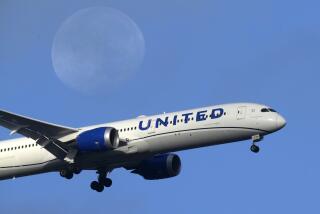Navigating holiday airfares is more complicated this year
- Share via
Crowded airports and blizzard-related cancellations get most of the headlines, but for some passengers, the holiday travel headaches start weeks in advance with the hunt for flights.
Which tickets guarantee a family with small kids can sit together? How many checked bags — and bag fees — will be needed to make sure gifts make it under the tree?
Complicating the hunt for airline tickets this year are the added options travelers now face when booking seats, including a wider availability of no-frills basic economy fares and bundles of extras that can be purchased for additional fees.
No-frills fares historically have been the domain of budget carriers, but legacy airlines have started rolling out their own stripped-down tickets.
Delta Air Lines has offered basic economy, the cheaper but more restrictive version of a typical coach ticket, for a few years. United Airlines and American Airlines introduced similar airfares this year.
A traveler shopping for a flight from Los Angeles to Boston the day before Thanksgiving, for example, has four ticket options on United alone: basic economy, economy, flexible economy and first class.
United also has expanded its selection of “bundles” — offers that pair two perks at a discounted rate — over the last year. Fliers booking United’s standard coach seat on that Thanksgiving Eve flight, for example, have the option of purchasing one of two paired upgrades: extra legroom and a checked bag, or extra legroom and expedited check-in and boarding, for roughly $195 and $220, respectively.
‘Too many combinations’
Airlines say the move to add new types of airfares and bundles of perks is about giving consumers the ability to customize their travel, paying only for the amenities they want.
The problem: Many travelers don’t log enough miles to know how to make the most of the new approach, at least not without some legwork. Only 13% of American’s customers fly the carrier more than once a year, airline President Robert Isom said recently.
Julie Michiels, 40, of Chicago said that with all the variables that go into selecting a flight, “there’s just too many combinations of information.” On her first trip on a budget air carrier, she didn’t realize until checking in for the flight that she had to pay a fee to arrange a seat near her traveling companion, and another fee to print her boarding pass.
“If you only try something once a year, your expertise is going to be limited — it doesn’t matter if it’s a gallon of milk or an airline ticket,” said Candice Irvin, managing director and U.S. airlines leader at Deloitte Consulting.
The a la carte approach is generally good for consumers, Irvin said, as long as the rules and restrictions are clear.
And for those who don’t want or need many amenities when flying, the stripped-down approach to airfares could save time and money.
Being a smart shopper
The key to booking holiday travel, experts say, is to check more than one flight search tool, including the airline’s website, because individual travel sites don’t cover every deal.
Hopper, the airfare prediction and booking app, this year rolled out a feature called Fair Bear that helps travelers figure out the true cost of their basic fare.
It’s also important to look at the restrictions and fees to make sure the headline fares are apples-to-apples comparisons.
Different airlines have slightly different rules, for example, when it comes to basic economy.
None lets fliers pick a seat in advance, but Delta allows overhead bin space for basic economy travelers. United and American don’t allow fliers in this class to carry more than one small personal item aboard, unless they are frequent fliers or have the airline’s credit card.
Carry-on limitations that cause travelers to check a bag and pay a fee — even if the bag is checked at the gate — may cancel out the savings associated with a basic economy ticket.
United and American said they work to make sure passengers understand what they’re buying, whether they’re booking through the airline or another travel website.
American sends basic economy ticketholders an email reminding them of the restrictions three days before their trip, just in case, spokesman Josh Freed said. Both airlines said they have found most customers who buy basic economy tickets arrive at the airport aware of the restrictions.
And although there might be a handful of new choices, the overall booking experience hasn’t changed much, Freed said.
Bundles seem to be working
Jeff Christensen, United’s managing director of ancillary pricing, said the airline has seen success with the bundles of perks it introduced last year and expanded in June. United plans to keep increasing the number of options, though customers won’t be offered more than two packages at any time, he said.
Most bundles cost 10% to 25% less than the services would cost if bought individually, and the most popular pair an extra-legroom seat with a checked bag or expedited check-in, security and boarding, Christensen said.
Even when customers don’t buy a bundle, seeing one seems to make them more likely to consider extra services: Customers were more likely to buy extra legroom when choosing a seat after being offered a bundle that included the perk, Christensen said.
Travelers generally don’t mind the introduction of stripped-down tickets and “extras” for purchase unless restrictions or fees come as a surprise, said George Hobica, founder and president of Airfarewatchdog, an airfare listing and travel advice website.
“Airlines wouldn’t be selling it if people weren’t buying it,” Hobica said.
More to Read
Inside the business of entertainment
The Wide Shot brings you news, analysis and insights on everything from streaming wars to production — and what it all means for the future.
You may occasionally receive promotional content from the Los Angeles Times.










